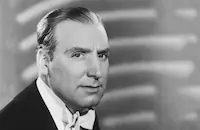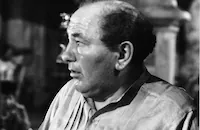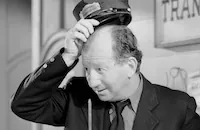Give Us This Night
Cast & Crew
Alexander Hall
Jan Kiepura
Gladys Swarthout
Philip Merivale
Alan Mowbray
Benny Baker
Film Details
Technical Specs

Synopsis
While Italian tenor Forcellini is pelted with eggs during his performance of Verdi's Il Trovatore , fisherman Antonio Belizza delights the townspeople with his own, beautiful, tenor voice. Later, Maestro Marcello Bonetti rehearses his new opera with his ward, singer Maria Severelli, and Forcellini, but she refuses to sing with Forcellini when he butchers Marcello's music. Meanwhile, Antonio, who slept in a church to avoid the police after starting a riot at the opera, is caught, but when a crowd asks him to sing Verdi for them, he performs an aria, then slips away to a mass and again eludes the police. At mass, Maria and Antonio hear each other sing, and she falls in love with his voice. Because it is forbidden for a woman to talk to a man in church, Antonio must leave the church to meet Maria and is arrested. In jail, Antonio auditions for Marcello, who offers him 2,000 lire a week to sing the lead in his opera of Romeo and Juliet in Naples. After Antonio's mama, however, forbids her son to leave, he learns that his father became a famous tenor and deserted his mother. Antonio leaves for Naples, and his mama disowns him. In Naples, Marcello helps Antonio improve his voice and teaches him to act. When Maria and Antonio rehearse a balcony love scene, Antonio gives her an unscripted kiss and ashamed of his bad acting, threatens to walk out on the show. Maria convinces him to stay, and later, he asks her if she sometimes gets confused on stage about being Maria or Juliet. She tells him that when he sings he is Romeo, and they kiss. Marcello then asks Antonio to sing his new love song, which he wrote for his wedding to Maria. Maria walks in while Antonio is singing and is enthralled, but Antonio tells her that Marcello wrote the song for her. She then joins Marcello in singing the song, and Antonio, dejected, leaves. Later Maria confesses to Marcello that she and Antonio are in love, then runs to get him, only to discover that he has run away. Because the opera is opening that night, Marcello and Maria must find Antonio and look for him at his mother's house. At first Mama is stubborn, but when Maria tells her she loves Antonio, she agrees to help. Meanwhile, Marcello is forced to offer Forcellini 5,000 lire to sing the part of Romeo. Mama then appeals to Antonio's ego by telling him Forcellini will play Romeo. Antonio agrees to return to Naples, and Mama follows. The opera starts without him, but, in the middle of the balcony scene, as a drunk Forcellini sings off-key in the wings, Antonio holds a gun on him, forcing him to give him his costume. Antonio then enters as Romeo, and he and Maria sing the balcony aria together while Forcellini is arrested for indecent exposure. As a proud Mama watches, Maria and Antonio kiss and receive a standing ovation.

Director

Alexander Hall
Cast
Jan Kiepura
Gladys Swarthout

Philip Merivale

Alan Mowbray
Benny Baker
Michelette Burani

Sidney Toler

Charles Judels
William Collier Sr.
John Miltern
Mattie Edwards
Chloe Douglas
Maurice Cass
Nick Thompson
Robert E. Milasch
Monte Carter
Constantine Romanoff
Sam Appel
Jack Raymond
Roger Joseph
Charles Stevens

Hank Mann
John Picorri
Jerry Mandy
Alf P. James
Jack Burdette
Harry Semels
Jules Cowles
Sidney D'albrook
James Aubrey

William Franey

Billy Gilbert
Frank Hall Crane
Gaston Glass
Alida Vischer
Laura Puente
Frank Mayo
Bill Begg
Cecil Weston
Frances Morris
Crew
Roland Anderson
Jacques Bachrach
Travis Banton
John Cope
Hans Dreier
A. E. Freudeman
Oscar Hammerstein Ii
Henry Herzbrun
Ellsworth Hoagland
James Hogan
Gordon Jennings
Erich Wolfgang Korngold
Vee Lawnhurst
William Lebaron
Harry Lindgren
Edwin Justus Mayer
Victor Milner
Frank Partos
Tot Seymour
Lynn Starling
Bobby Vernon
Adolph Zukor

Film Details
Technical Specs

Quotes
Trivia
Notes
Portions of this film were shot on location at Three Arch Bay, near Laguna, CA. Screen Achievements Bulletin records at the AMPAS Library include a memorandum dated January 7, 1936 in which Oscar Hammerstein II and Edwin Justus Mayer are both credited with the screenplay. By January 10, 1936, Hammerstein's name is omitted and Lynn Starling is credited with Mayer. Hollywood Reporter announced on July 17, 1936 that songs from this film were recorded in five languages for international showings.












